These processes, in contact programs, result in to cognitive or mental learning outcomes as a result of interaction and learning efforts made by students in control & guidance of a faculty member. Class room based instructional processes may use teaching methods individually or in combination of two or more methods such as 1. Interactive lecture, 2. Demonstration, 3. Tutorial, 4. Group discussion, 5. Case study, 6. Class room Seminar or panel discussion etc.
B. Laboratory based instructional Processes
Broad Goals of Experiential Learning
Instructions based on Laboratory, Workshops, Project Work and Industrial exposures etc. should be planned in consonance with the philosophy developed by the Governing Trust of an Educational Enterprise. The philosophy can be evolved by setting up broad goals or out comes at the end of the experiential learning period of a program which may spread from 2 to 8 semesters.
B1. The recommended sample Broad Goals of the experiential Learning in Labs, Workshops, and Project work, for a graduate Technological Program can be:
- Comprehending and developing insight in to the already learned theory and particularly relating it with the world of work.
- Getting first hand experiences of technological practices & problems of world of work
- Investigating and reporting technological phenomena commensurate with the requirements of its receiver.
- Acquiring entry level competencies of solving business/technological problems (in teams), which cut across courses, specializations and technology disciplines
- B2. Types of Laboratory Experiences:
Current experiential practices followed in most of the Technical Education Institutions need a lot of improvements and reforms. The first step should be to analyze the types of Lab based experiences they are providing to their students. A comprehensive list of lab based experiences has been recommended below to maximize the benefits to the students of forward looking organizations wanting to improve quality of their performance and enhance satisfaction of their customer students.
1) Measuring properties of a particular an element or a system:
2) Understanding an application of a concept/ principle:
3) Verifying laws and principles:
4) Investigating cause & effects relationships in a given system
5) Synthesising a system/ Developing an appliance/ gadget
6) Developing psychomotor skills for operating technological systems
7) Solving open ended technical problems :
Example 7.1. Given a resister and capacitor, make a high pass filter and find its frequency response.
Example 7.2. Develop a device to economize the expenses of water and electricity in desert coolers.
B3. Developing ‘written communications skills’ during Experiential Learning.
Reserve some open ended experiences for writing open ended Technical Reports for Lab/ Workshop/ Major Project etc, in order to provide a very unique opportunity to develop abilities of writing a well structured & a specific addressee focused technical reports & thus develop written communications skills in learners.
C. Minor / Major based instructional Processes
C1. Types of Minor Project based Experiences:
• Presentation of a departmental seminar on an emerging topic in a competitive environment
• Preparation a new laboratory set-up for including new & relevant experimental learning
• Preparation of a set of charts for laboratories/ workshops having professional look
• Development of department related workshop facilities and gadgets for learning new & relevant skills.
• Preparation of teaching–learning resources such as: a set of transparencies and MS power points presentations related to a selected / allotted topic.
• Preparation of a computer program promoting efficiency of institutes’ academic management & record keeping.
• Worthwhile contribution in the development of self-learning facilities in the hostel/ campus.
C2. Types of major Project based Experiences
Analyze existing systems & develop new systems
- Explore substitutes of an imported material or a product or a process or a combination of all
- Develop a new product/ process commensurate with the findings of a market research
- Feasibility study to select out of competing technologies or trends
- Developing an innovative experimental research set-up or a project proposal
- Proposing improvement in existing lab set up and designing a new set up
Developing a new lab machine / equipment - Design, make, test, evaluate & a new/ modified product
D. Co-curricular activities based instructional Processes
Technical Models Exhibition, Technology Inter-departmental Seminars or Inter Colleges Conferences or Technology based competition etc: Every activity should have aims/ objectives, checklists for learning, follow up activities etc.
E. Work Places visit/ training based instructional Processes
Visit to field / industry / business chambers of commerce / technology demo /exhibitions:
Aims/ objectives, checklists for learning, follow up activities
F. Extra-curricular activities based instructional Processes
Annual cultural functions, sports, games and debate competition,

No comments:
Post a Comment